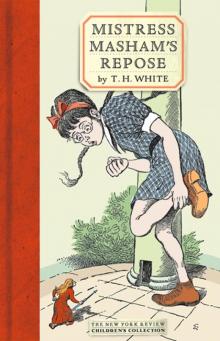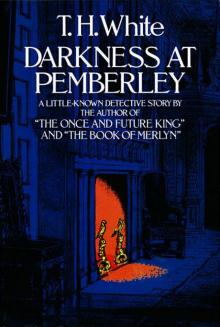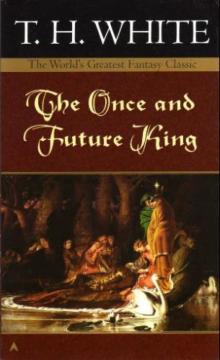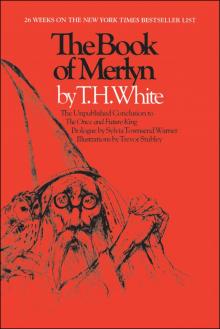- Home
- T. H. White
Darkness at Pemberley Page 11
Darkness at Pemberley Read online
Page 11
"You're sure it won't do Mauleverer any permanent harm?"
"No," said the surgeon, looking a little surprised, "the fellow said that if Mauleverer stayed in it he'd choke, and finally be rendered insensible. But he said it wasn't a lethal gas at all."
"Why I ask," said Buller, "is because we've now decided that Mauleverer must be taken alive. Elizabeth thinks, and I suppose she's right, that we can't kill the man in cold blood. You see, the point is that we don't want to kill him: we're being stampeded into it out of funk, when you come to think of it."
"But I do want to kill him, and I'm sure my friend the chemist does. What's the good of gassing him out if we don't? He'll simply come back again."
"I know," said Buller wearily. "If we had any sense we'd kill him, of course. But other things enter into it. Elizabeth has all sorts of loyalties and decencies which one can understand. In the last resort she'd rather be killed herself than kill somebody else for fear of it."
"Then she's a fool," said the surgeon.
"No," said Buller. "Or if she is, so am I."
"Naturally."
"In any case, it's definitely decided. We're going to chase him out of the house alive, and let the future look after itself."
There was a tone in Buller's voice which left the surgeon no other course except to shrug his shoulders helplessly.
"I've been thinking," Buller continued, "that we might be able to do without the gas attack altogether. That creature has been living in the chimneys for two days. I don't suppose he has any provisions with him, and he can't have brought sufficient water. He hasn't needed to. He's had access down the kitchen chimney to all the provisions of the household, and any one of a dozen taps in different sinks and bathrooms can keep him watered. Water's the main problem after all. He may have brought some concentrated form of food, as far as that goes, but the water he can't have brought. It's a hundred to one that he comes through the fireplace into one bedroom or another, every night, and goes through the side door into the bathroom for a drink. What I suggest is that we should lay for him to-night, and then perhaps we shall be able to do without the gas to-morrow."
"And when we catch him what do we do?"
"Knock him on the head with a thick stick, I suppose, and turn him out into the road."
"And what then?"
"Don't ask me. I suppose the family goes off in a yacht and becomes nomadic until they hear of his death. It's a wretched situation, but I agree with Elizabeth."
"Well," said the surgeon, "if it's got to be done it's worth trying. But we haven't enough people to watch all the bathrooms."
"No. We shall have to trust to luck. We'll need two in each room, and we'll have to pick on the most likely. Charles will have to look after himself for once. We'll give him a fire and tell him not to sleep a wink. If you don't mind, we won't tell Elizabeth. She'll be better sleeping as usual, with Kingdom in the passage outside. She'd better have a fire too. And we'll leave one of the gardeners outside the maids' bedrooms. That'll leave you; Smith; the gamekeeper; two grooms and myself. We'd better leave the rest to take turns out of doors."
"It seems an inadequate number for watching all the taps."
"Actually, I think we've got a good chance. We'll leave you and Smith in the kitchen. That's a likely spot because there's food there as well as drink. Then I'll make a little tour, now, before dusk, in the best approved style with my detective's magnifying glass. Although the chimneys have just been swept, and whatever precautions the man may take, he can't move about indefinitely without traces of soot. He probably cleans up mighty carefully after him, but its beyond human possibility for him to be absolutely clean. I ought to be able to pick up some signs or other in the bathroom or rooms which he generally favours. We'll post the other traps according to that. Any suggestions?"
"No. Except that if he chooses the kitchen he's going to have a headache."
CHAPTER XIII
The third night of darkness at Pemberley found the garrison as silent as the house which surrounded them. Buller's search had revealed three suspect areas besides the kitchen: one for each main chimney stack. One of these was a bedroom and bathroom which were not in use, within three doors of Charles's own room in the same passage. This area seemed to Buller the most likely after the kitchen, and he selected it for his own post, taking the gamekeeper to watch with him.
The two grooms were posted at the far end of the façade, the bedroom known as Queen Caroline's room, over the museum. This left a suspicious sink in the servants' quarters unguarded; but, as Buller said, it was three to one that the fox would visit one of the other bolt-holes.
Wilder and Smith sat in the kitchen, in wooden chairs on either side of the wide fireplace. The chairs were solid and comfortless, but they were too strongly built to creak. So the two watchers in the darkness were able to alter their positions every twenty minutes or so, when the cramp became intolerable. The cockroaches scuttled over the brick floor undisturbed, giving to the black stillness a pianissimo background of miniature life, and a tabby cat crouched over a possible mousehole in taut and patient attention.
The kitchen clock—half an hour wrong, as usual—ticked out the minutes with a tinny noise, and Mrs. Bossom's own alarm clock on the dresser answered antiphonically. The two separate counters combined in Wilder's head, making endless rhythms and varied reiterations. He remembered the train wheels of his childhood, which had always repeated "I-think-I-can. I-think-I-can," on the up grade, and "I-thought-I-could. I-thought-I-could. I-thought-I-could," as they came down hill. Mrs. Bossom's clock now mentioned to him "Per-haps He-will. Per-haps He-will. Per-haps He-will" through the interminable hours of the night.
Buller, in the bathroom upstairs, was in a worse plight. He had nothing to sit down on but a bathroom chair with a rush bottom, which sounded at every movement. The gamekeeper, on the other side of the door, had nothing to sit on but the rim of the bath itself, and this he disdained. He stood erect on his own feet for three hours, without apparent movement.
The plan of this couple was to lay their trap on either side of the bathroom door. Buller was afraid to wait in the bedroom itself, in case some chance movement should discover them to the intruder before he was fairly away from the fireplace. He wanted Mauleverer to come right across the room and into the bathroom for his drink, before they chanced their leap upon him.
The two grooms were in the same position at the other end of the façade. They conversed in whispers about Vitty Kerumby and how she had been a waller before Elizabeth took her in hand.
*****
Mauleverer happened to visit the kitchen first. He came down the chimney as silently as death and reached one foot over the cooking range. He was within two feet, on either side, of the seated figures; but he did not see them. Neither did they see him. He sat on the range for a moment, making some adjustment. Then he stepped off on to Wilder's toe.
Wilder moved it with a jerk and a muffled exclamation. Smith whispered quickly "What is it?"
Wilder hissed: "Did you touch me?"
"No."
The light of a torch sprang through the darkness, picking out the kitchen range and chimney. There was nothing to be seen.
*****
The grooms were still confabulating about horses. One of them was telling some story about a former master. "Ah, he says, Chippy, you get up on 'im while they're a-holding of his 'ead (and mind, I'm telling you, he was a nappy one: a-waltzing round of us the 'ole time like a primer balleriner and all but a-bitin' of 'is own tail) and then when yore up, Chippy, 'e says, I'll 'and you this 'ere soda water siphon afore 'e gets away. Yes, 'e did, the old so-and-so. Them very words. Mincing-like, you might say. So I thinks to myself: All right, me old cock, we'll see who's who—Hullo! So I touches me cap, respectful-like, and when I sees me chance I'm up on the old barstad before he know'd what'd 'it 'im. And the old man, 'e's 'opping round like a turkey, clasping this 'ere siphon to 'is bosom and 'ollerin' to me to catch a hold. Which I did before we begins
to buck: and then hoy-hullo! round that tan we goes like the fox in the 'en 'ouse. Well, when we'd cleared the air a bit we fetches up in front of the gov'ner—'e was up in the 'arf-a-crown seats by then, you may imagine—and 'e yells out as if he was dying: Chippy, 'e's going to rear! Get the siphon ready, Chippy, 'e says, and when I shouts out Now! give 'im a squirt. Don't do it before I says, 'e says, or you'll ruin the 'ole experiment. So then this 'orse—'e was a raking great skewbald with an eye like a rhinoceros—this 'orse begins to stand up for 'is country, and the gov'ner 'e squeals out Now! and I ups with the soda water siphon and catches 'im a fair beauty. All over 'is silk 'at, it was, and down behind 'is spectacles. That was the only experience I ever 'ad of curing an 'orse with soda water."
The darkness outside the bathroom door became a shade less dense, and the smallest wisp of soot fell shortly afterwards in the chimney.
*****
Buller had been motionless for forty minutes. His limbs, he found, sooner or later passed the period of sensation and petrified into agony. The discomfort became less unbearable when one had forgotten what comfort was. He interested himself in the drip of water from the bath tap, trying to discover if there was any complicated temporal relationship between the drops. He counted between the drops. Twenty-one. Nineteen. Seven. Nine. Nineteen.... There seemed to be no equation. One would have to count all night, if the recurrent was widely spaced, before one could hope to establish a sequence. And yet there ought to be. His mind wandered off among capillary attractions, and water pressures at the reservoir.
A vague shape came through the door. He waited and it pressed his shoulder. It was the gamekeeper. How on earth, Buller wondered, did he get out of the room in the first place without my noticing him?
The gamekeeper talked softly into his ear, without whispering, but as quietly as the wind of night.
"Something stood in the doorway, sir," he said, "a moment agone. I waited for 'im to come in, but he cleared again. I've just been into the other room, but there's nothing there."
Buller whispered: "Are you sure?"
"I couldn't make him out," said the keeper, "but he was there right enough. His hands was there as plain as day."
"If you're sure you saw him——"
"I saw him plain, his hands before him in the darkness and his eyes big: big like an owl's. He'd be a black creature, seemingly?"
"But why did he go again?"
The keeper moved deprecatingly in the dark: "That chair, sir," he said, "he's a difficult one to be silent with."
Buller said: "Well, if we've scared him away from here, there are still the others. Perhaps he'll visit them. And again, he may not have seen us at all. He may have gone away for something else. After all, he's got no reason to be suspicious and he can't see in the dark any more than we can. Are you sure you saw him?"
"He was a black creature," said the other slowly, "in the black of night."
"Well, we'll stay in case he comes back."
*****
In the kitchen Wilder was muttering to Smith: "God knows what it was. It might have been the cat, I suppose. Anyway we'll wait here. We don't want to go clattering about the place. Even if it was him, and we've scared him away, he may try one of the other traps; and we don't want to queer their pitch."
*****
In the far wing the grooms were still talking. Their voices had risen now beyond the last vestiges of concealment. The rise and fall of the monologues was audible, not only in the other room as it had been before, but even in the passage. "—and 'e said: That 'orse is lame in the left 'and front leg, I seen it as it was passing through the square. Oh, is it, I says, and I 'as 'em all out in the yard and walks 'em up and down in front of 'im. Now, I says to 'im, in a civil tone of voice you understand, would you know the 'orse as was lame in 'is near fore? I says..."
*****
"Something dragging. Hark.... It's stopped now."
Buller started to his feet. "This is no kind of game!" he exclaimed out loud. "Either you've got nerves or I'm wasting my time."
He threw open the door into the passage, and started back, jerking his hand nervously above his pocket.
A figure was sagging in the entrance, sharply outlined against the electric light. It was propped up against the door jamb. The head hung forward over the chest, while something dripped monotonously from the collar, dripped into a wide and sluggish pool which spread and spread along the passage.
The keeper moved over to Buller's elbow and breathed quietly, in his ear: "There's somebody been moving about outside, in the passage."
Buller answered: "Kingdom's there: outside Miss Elizabeth's door."
"Kingdom never moved like that."
"What is it then?"
CHAPTER XIV
Buller lowered Kingdom's body gently to the floor, and stepped over it into the passage, wiping his hands. He was feeling sick, but conscious that the keeper was watching him for a lead, wondering what they ought to do. There was nothing to do.
Buller made a noise as if he were clearing his mouth of a foul taste and said:
"Help me to clear this up."
They fetched pails and did their best, laying the body inside the bathroom in case Elizabeth should wake and come out of her room.
On the bathroom door four words had been smeared in blood—smeared, as Buller realised, whilst they had been sitting inside. The message was cryptic:
NO WATER DRINKS BLOOD
Buller said: "Faugh! An old man like that!" He wiped the door clean viciously, and added: "Dabbling about like a muck-puppy!"
Charles had heard them moving about, and opened his door cautiously. He looked at Buller with an expression of enquiry. Buller nodded sourly towards the bathroom door and Charles went across.
The old man's throat had been cut like the porter's. He looked shrivelled and useless, horrid not because of his connection with humanity but because of that connection tragically wasted: because what had once been human was now a grotesque thing. Charles stayed there so long that Buller went in to see what he was doing. He had folded the old man's hands and smoothed the twisted face into a picture of dignity. Charles was as white as the dead man.
He said: "How did this happen?"
Buller said: "I don't know. We'd better collect the others."
He sent the gamekeeper to call in the watchers at the other traps. Wilder came and made his report. The grooms reported nothing.
Buller said: "Mauleverer must have visited the kitchen first. When he blundered into Dr. Wilder he nipped up the chimney in a second. That put him on his guard and he was just as much on the qui vive as we were. I expect he visited the grooms' post, and the keeper here says he visited ours. He twigged before we did. Kingdom was alone in the passage. This was his idea of reprisal."
Charles said: "Kingdom was sixty-nine years old."
The party stood round in an atmosphere of constraint. They were all thinking of the stealthy footfalls in the passage, under the unwinking electric light; of the mad face grinning with expectation, and the knife. Nobody would mention these things, however.
Buller said: "Now is the moment when we call in the police, or not. Elizabeth said yesterday that we were not to kill Mauleverer, and I agreed with her. But this makes a difference."
Charles looked round the circle of faces. He was grim now and almost cheerful.
"I think we are agreed," he said. "Is there anybody here who would rather have the police?"
Buller added, unnecessarily: "If we get in the police now, Mauleverer may have cleared out for fear that we should do so. You see, he will realise that if we do call them in we shall be able to search the house thoroughly, and the chimneys. As like as not, he's cleared off. Then we shouldn't find him. There would be endless trouble. Like Sir Charles's fat man in the night club, he wouldn't be believed in. Even if we were fortunate enough to get out of it without one or other of ourselves being hanged—remember this is an ex-convict's house—we should be no nearer Mauleverer. He has an alibi pat
you may be sure. Then the police would know that there was some sort of a feud between Sir Charles and him, and we should never be able to get him afterwards. If he came back we shouldn't be able to act with freedom. The disappearance of Mauleverer, even if we were fortunate enough to pull it off, would automatically throw suspicion on Sir Charles. And Sir Charles would still be in exactly the same danger from Mauleverer——"
Charles cut him short.
"You have all seen poor Kingdom," he said. "I don't think we need argue about it."
But Buller added: "It's only fair that everybody should understand exactly what we are in for. If we don't call in the police we can't get a doctor's certificate and we shall have to bury Kingdom secretly in the grounds. If we are not able to explain this and keep it quiet afterwards we are all bound to get into very serious trouble, perhaps even the gallows——"
Wilder interrupted. He said: "I will give a doctor's certificate."
"That is absolutely unfair on you," said Buller. "It can't be done."
"Nevertheless, I'm going to do it. I can lay him out, too, so that he looks all right in a coffin. After all, if he was sixty-nine nobody can be very surprised about it."
The gamekeeper said: "Begging your pardon, Sir Charles, but whatever way it's settled I think we should all be agreed on doing without the policemen."
Smith said: "Yes, sir." They were surprised to note that he was crying.
*****
By the time Elizabeth woke up—she possessed the virtue of sleeping soundly—the passage was clear again and Kingdom was decently laid in one of the bedrooms. Wilder had dressed him in a white sheet, which curved about his neck, hiding the gash. The coffin was ordered, and the measurements enclosed, from Derby. Charles went into her room and broke the news before breakfast. She said nothing for a time and then asked:

 The Once and Future King (#1-4)
The Once and Future King (#1-4) Once & Future King 05 - The Book of Merlyn
Once & Future King 05 - The Book of Merlyn Mistress Masham's Repose
Mistress Masham's Repose Darkness at Pemberley
Darkness at Pemberley The Once and Future King
The Once and Future King The Book of Merlyn
The Book of Merlyn Candle in the Wind
Candle in the Wind